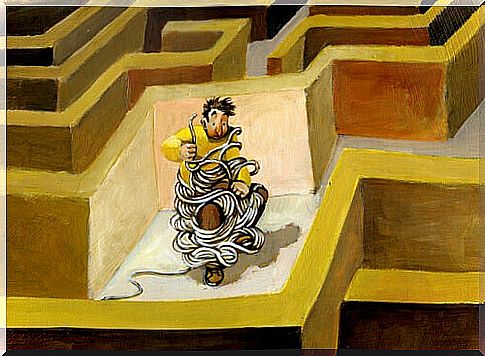Self-sabotage: When You Are Your Own Worst Enemy

Self-sabotage is the tendency to make things difficult for yourself by creating boundaries and complications that prevent you from reaching your goals.
If you think back to your past, you will probably remember some cases when you failed to reach your goals and you did not know how or why. One possible explanation could be self-sabotage.
Self-sabotage brings out the enemy within you. It may protect you from failure in the short term, but it will also prevent you from being successful. People who self-sabotage create obstacles because they unconsciously believe that they can do whatever the situation requires.
We will now look at the 4 most common forms of self-sabotage.
To deny what you need
The first type, and the most common, is to deny yourself things that you need or want. People hide their real desires by saying things like “it does not matter”, “I do not want it” or “I do not care”.
In this way, they protect themselves from being disappointed and do not have to accept that they have to work on improving their skills. However, they also put sticks in the wheel for their own success.
Self-sabotage occurs when they deny that they want to achieve a goal or when they unknowingly fail to fulfill a personal need. It is very important to learn the difference between when you really want something and when you want something but are afraid that you will not get it.
When you make this distinction, you will be able to begin to protect yourself from destructive behaviors.

Procrastinate: to wait until the last minute
One of the most effective ways to fail both in your personal life and in working life is to procrastinate. It’s a toxic habit because you think you’re in control of things when you’re really just putting off what you’re going to do.
Procrastination is a defense mechanism because it protects you from feeling incompetent, but it also prevents you from seeing what you can really do. In other words, it makes you feel like you’re working to reach a goal when that’s not really the case.
To be inconsistent: to start something and stop when it gets tough
You will no doubt fail with something when you start a project and abandon it along the way. But if you practice, you can become more consistent.
If you do not complete the task, you do not have to evaluate whether you did well or not. You may be able to do it well, but you do not know how to handle success. This is a self-sabotage that protects people from success when they feel they do not deserve it.
Excuses for not making a decision
Making a decision gives you responsibility for what happens, which in turn depends on how important the decision is. Self-sabotage protects you from accepting responsibility because you refuse to take a stand.
By avoiding making decisions, you protect yourself from taking control of your life and starting what you have chosen. It also forces you to look at your life from the outside. This reinforces the perception that you are not good enough to achieve more.

Avoidant personality disorder
When people are faced with difficulties, they will have three options: confront, avoid or postpone. In other words, you can look for a solution (confront), try to convince yourself that it is not something that affects you or look the other way (avoid), or wait to see what happens (postpone).
It is good if you take your time before you do something when you think of a solution, but if you postpone things for too long, this can become a habit that will lower your self-esteem.
If you make this a habit during adolescence and the younger part of adulthood, you will not be able to take advantage of situations that allow you to develop new abilities. If you avoid confronting difficult situations or fail to take advantage of opportunities to develop, you risk developing an avoidant personality disorder.
An avoidant personality disorder leads to self-sabotage because the person in question convinces himself that he can not do anything. The person may not have the right abilities, but this does not mean that you can not use the situation to grow as a person.
People with an avoidant personality disorder feel that they can not overcome challenges, but that is their biggest limitation. Their mistake is that they confuse a lack of skills with inability.
They need to stop avoiding things that make them doubt their own ability. They must allow themselves to grow as human beings. Remember that you cannot develop if you are not faced with challenges.
Low self-esteem
Since you have a low opinion about what you can do, you will not love yourself so much. Since you do not love yourself, you tend not to trust your abilities. Hence the relationship between self-sabotage and a low self-esteem.
People with low self-esteem do not develop because they do not go outside their own comfort zone. The reason for this is that they think they do not deserve the opportunity. That they will not be able to do it. That they are not worthy of the goal they are trying to achieve.
Overprotective family environment
Growing up in an overprotective family environment creates two messages in people’s heads concerning themselves and their abilities. The first is that their family loves them and protects them, and that they are therefore not alone. The second is that they need parental protection because they cannot do things themselves and because they are not strong enough.
As guardians are overprotective, they tend to confuse these messages. Overprotective families tend to be dependent on feeling competent and secure. So when they grow up and become independent, they sabotage themselves as a defense mechanism. The less protection they receive from their family, the more they sabotage themselves.
Self-sabotage can easily turn into a vicious circle. If you do not give yourself the chance to achieve something, you will not challenge yourself, and then you will not develop.
You miss the opportunity to build new skills and improve the skills you already have. You then continue to believe that you can not do something, that you do not want to or that you will not be able to do it in a good way.
Many people, if not all, have a mini-saboteur within themselves, and this is something you have to learn to live with. This little person will tell you that you can not achieve your goals. This will make you doubt yourself and not dare to go outside your comfort zone.
The trick is to learn how to listen to doubt without getting caught up in doubt for good, which of course takes a lot of patience.

For the above reasons, self-sabotage creates a constant feeling of insecurity. It is important to see and break the vicious circle as soon as possible.
Overcoming self-sabotage, working on your self-esteem builds your strengths and improves your weaknesses. The most important thing, however, is that you give yourself a chance.









